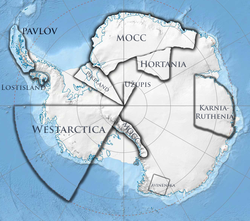Antarctic Micronational Union
Antarctic Micronational Union | |
|---|---|
 Flag | |
 Members of the Antarctic Micronational Union | |
| Official languages | English |
| Type | Intermicronational organization |
| Membership | 9 member states |
| Leaders | |
• Administrative-General | Yaroslav Mar |
| Establishment | |
• Founded | 6 December 2008 |
• Reformed | 15 January 2010 |
• Revived | 24 February 2020 |
Website amu.lostisland.org | |
The Antarctic Micronational Union (AMU) is an intermicronational organization that aims to regulate micronational claims in Antarctica.[1][2][3] The purpose of the AMU is to protect the claims of its members against other claimants.[4]
History[]
The AMU was officially established on December 6, 2008 as the Grupo Del Acuerdo Micronational Antartico (GAMA) by the Kingdom of Finismund, Marie State and the Grand Duchy of Flandrensis. The GAMA was founded as a result of a conflict between Finismund, Marie State and Flandrensis against Jon Lawrence of Westarctica, known as the Great Micronational Antarctic War. This conflict ended on September 24, 2010, when Niels of Flandrensis and Travis McHenry, founder of Westarctica signed the West-Antarctic Treaty and joined the AMU.[2][5][6][7]
After undergoing a number of reforms and periods of inactivity, the AMU was revived to its present state on February 24, 2020. The Administrative-General of the AMU since September 2014 is Yaroslav Mar, the President of Lostisland, re-elected to another term in February 2020.[8]
Members[]
Members are the following:[9]
- Republic of Avinenska
- Missionary Order of the Celtic Cross
- Hortanian Empire
- Empire of Karnia-Ruthenia
- Federal Republic of Lostisland
- Empire of Pavlov
- Grand Duchy of Pikeland
- Republic of Užupis
- Grand Duchy of Westarctica
External links[]
References[]
- ^ Lonely Planet Kids (2015). You Rule!: Create Your Own Country (Lonely Planet Kids). Lonely Planet. p. 13. ISBN 978-1743607848.
- ^ Jump up to: a b Mamchitz, Roman (August 28, 2010). "Родезийская война в Антарктиде" [The Rhodesian War in Antarctica]. Chaskor.ru. Частный Корреспондент. Retrieved July 8, 2020.
- ^ Sharukho I. N., Soroka A. V. (2017). Геополитика и современная политическая карта мира [Geopolitics and the contemporary world map] (in Russian). МГУ имени А. А. Кулешова. p. 71. ISBN 978-985-568-358-3.
- ^ Kiptenko, V. K. & Lyashenko, M. Y. (2014). "Генетична типологія мікронацій (віртуальних держав)" [Genetic typology of micronations (virtual states)] (PDF). Географія та туризм (in Ukrainian). 24: 173–184.
- ^ Harlamov, Sergey (August 29, 2017). "Шутники, мошенники и отщепенцы: кто и зачем создает виртуальные государства" [Jokers, fraudsters and reneges: who creates micronations and why]. Ruposters.ru. Ruposters.ru. Retrieved July 8, 2020.
- ^ Bahareth, Mohammad (2011). Micronations: For Those Who Are Tired of Existing Incompetent Governments and Are Longing for Something New and Refreshing. Lonely Planet. p. 2010. ISBN 978-1-4620-6926-2.
- ^ Zhmilevski V. D. (2017). Специфические территории. Международная классификация [Specific territories. An international classification] (in Russian). Издательство «Бук». p. 18. ISBN 978-5-906954-32-9.
- ^ "History". Antarctic Micronational Union. Retrieved September 4, 2020.
- ^ "Members". Antarctic Micronational Union. Retrieved March 21, 2021.
- Micronations
- International organizations
- Antarctica